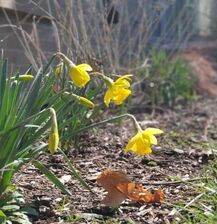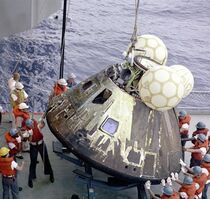 It is the season of resurrection. In the liturgical sense, this blog post/newsletter column should be published the week of Easter. But it is also a season when we can start to see a world transformed: many of our members have begun receiving vaccines for COVID-19, and leadership at the church is working hard to put together plans for how we will regather in person. Most of us became aware of COVID-19 during Lent in 2020, and there have been times in the last year where it has felt like a single, unbroken season of fasting and doing without- an extended period in the metaphorical desert. With spring this year, we start to move out of the desert and toward whatever comes next. Here’s the thing about resurrection: it is never a restoration back to what was. It is the creation of something new, related to what has come before but somehow transcending it. For much of this winter, we introduced our worship service with words from Arundati Roy, who wrote last March, Historically, pandemics have forced humans to break with the past and imagine their world anew. This one is no different. It is a portal, a gateway between one world and the next. We can choose to walk through it, dragging the carcasses of our prejudice and hatred, our avarice, our data banks and dead ideas, our dead rivers and smoky skies behind us. Or we can walk through lightly, with little luggage, ready to imagine another world. And ready to fight for it. It is the season of resurrection. What is the world we imagine? What does Lincoln look like, in the aftermath of this year? What does our church? We are not simply going back to what was. As we begin to plan what comes next, how will our community be transformed? Note: I will be out of the office from April 5-12, and will not be checking or responding to emails during that time. Arundhati Roy article: https://www.ft.com/content/10d8f5e8-74eb-11ea-95fe-fcd274e920ca
0 Comments
 One year ago this March we left our building at 6300 A Street, to ‘flatten the curve to buy time for our health care workers to respond to the pandemic.’ At the time it felt like a dramatic, short term step to get ahead of a pandemic that was rapidly escalating. While announcing that we were closing our building, I went back to the long history of this congregation, which has survived and prospered through pandemics, world wards, economic depressions, and civil unrest in the past. As we began this leap into the unknown, those stories of commitment felt prescient. I do not know that any of us would have predicted, then, what we know now: that this pandemic would last for over a year, and that online worship would become the default for a time. That in March of 2021, we would still be out of our building, but starting to plan a return as the first members of our community began to be vaccinated. This has been a year of many experiments, many new ways of trying things both out of opportunity and necessity. One of my favorite movies is Apollo 13, which tells the story of the 1976 moon landing mission that had to be waved off, mid-flight, after an explosion on the spacecraft. There is a scene in the movie when engineers at NASA have to figure out how to fit a round air scrubber into a square hole, using nothing but the materials on hand on the spacecraft: much of congregational life in the last year has felt like that. From the first frantic months trying to figure out how to fit the square peg of worship into the round hole of the internet, to the worry about scarce resources, to the long wait before coming back home, there’s a lot in the story that resonates with the last 12 months of congregational life. On one hand, Apollo 13 is a sad story, a film about a triumph missed, and opportunity that slipped by in the aftermath of catastrophe- but that is not how the story is usually told. The story instead is one about ingenuity, courage, commitment, and support. As we mark one year since leaving our building at 6300 A St, I wonder what the story we will tell about this year will be? Will we tell the sad story, of how we were apart for a year? Or will we tell the story of commitment even in the midst of pandemic? We will remember this season for the rest of our lives. How will we commemorate it? And is it possible that we come out of it with a renewed sense of commitment to each other and our faith? |
Details
AuthorRev. Oscar Sinclair serves as the Settled Minister for The Unitarian Church of Lincoln, Nebraska. Archives
March 2024
Categories |
contact us and WE WILL GET BACK TO YOU AS SOON AS POSSIBLE: |
SIGN UP TO RECEIVE
|
THE UNITARIAN CHURCH
|
|

 RSS Feed
RSS Feed

